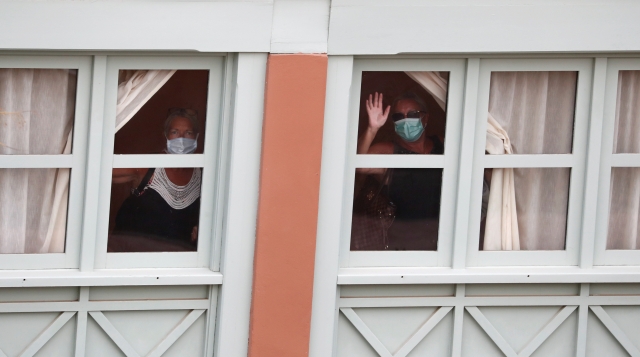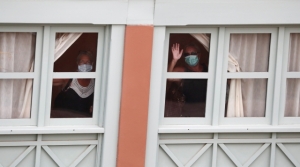COVID-19: How Long Will the Isolation Last?
Experts and health officials warn us daily to stay home for our own safety, as self-isolation and social distancing is considered the best precautionary measure to prevent the spread of the new coronavirus (COVID-19).
If you are infected and continue to socialize as normal, it is likely you will pass the virus on to between two and three friends or family members, who could each then go on to infect a further 2-3 people. Within one month, one case can lead to 244 other cases in this way, and in two months, this can soar to 59,604. That’s why social distancing and self-isolation is so important.
A large part of the population understands that being at home is an important prerequisite for defeating the virus, but for many, it is also quite stressful.
Many countries around the world are now implementing different measures in an attempt to enforce social distancing to slow the spread of COVID-19. They range from ending mass gatherings and closing public spaces like leisure centers, pubs and clubs, to closing schools and in some places a total lockdown with people forced to stay indoors.
People throughout the world try are adhering to these restrictions and avoiding going out as much as possible. However, the question is: How long should we stay in isolation, away from our normal lives, distanced from our friends and loved ones, workplaces, and in some cases fresh air and nature?
Unfortunately, this fight may not end for months, a year, or even more.
Researchers say we face a horrible choice: practice social distancing for months or let hundreds of thousands die.
Naturally, isolation around the world should last until there’s a vaccine or treatment to stop the pandemic. The exact date of this is unknown but could take at least a year.
“About 35 companies and academic institutions are racing to create such a vaccine, at least four of which already have candidates they have been testing in animals. The first of these – produced by Boston-based biotech firm Moderna – will enter human trials imminently,” The Guardian reported.
The main challenge is that it is almost impossible to stay isolated for a whole year- not only is it difficult in terms of mental health to stay locked indoors for such a long time but also in terms of finances, as people can’t access their workplaces or earn wages. Many have already lost their jobs when facilities closed amid the government lockdown.
New computer modeling research from Harvard University warns that it may be necessary for intermittent social distancing measures to be maintained into 2022 in the US unless other interventions such as vaccines, drug therapies and aggressive quarantine measures can be put into place. This is because while a one-off period of social distancing might delay the peak of the outbreak until later this year, there is likely to be a resurgence in cases towards the end of the year if the virus shows some seasonal variation.
Other relatively hopeful predictions say that lockdowns could last for 6-10 weeks.
Microsoft founder Bill Gates has warned that a “super painful” period of social isolation should now be the top priority in fighting the coronavirus across the US. He claimed that six to 10 weeks of hardcore isolation nationwide is now necessary.
The billionaire philanthropist also said that President Trump’s statements about potentially having the county open again in April are “not realistic,” pointing to the fact that the number of cases is still going up.
"We're entering into a tough period... If we do it right, we'll only have to do it once for 6 to 10 weeks, but... it has to be the whole country," he said, adding: “it is super painful to drive this very high degree of social isolation I call shutdown.”
In general, the peak of the virus lasts a month and a half. As for Georgia specifically, the peak of the pandemic here is expected in mid-April. Health experts claim that the end of April and the beginning of May will also be difficult, with an increasing number of COVID-19 cases.
"We should probably expect the peak of the illness in mid-April. The most important thing is to stay at home and follow all the recommendations carefully," Georgian immunologist Bidzina Kulumbegov said.
“In countries like ours, 35-40 days after the first case was discovered, the number of infected people began to increase sharply. The maximum number of patients in Georgia will probably be seen at the end of April. Under quarantine conditions, 20-30 cases can be detected per day. If there are no more than 1,000 cases per month, it means that the number of critical patients is on average 5% and Georgia will have to deal with their resuscitation," he said.
“The important thing is to stay home and follow all the recommendations carefully. No-one knows how long we will have to live in such conditions. British and American experts say that we will not be able to return to normal life until the summer. As for the second wave of the disease - so far, it has not been established that people are experiencing COVID-19 for a second time. The second wave means that the virus might be extinguished under quarantine conditions, people will be released from quarantine and then a new explosion can start. That's what China is afraid of now. Usually, the peak lasts about a month and a half, and then the number of cases will start to decrease,” Kulumbegov said.
“I think this idea, that if you close schools and shut restaurants for a couple of weeks, you solve the problem and get back to normal life, is not what’s going to happen,” says Adam Kucharski, an epidemiologist at the London School of Hygiene & Tropical Medicine and author of The Rules of Contagion, a book on how outbreaks spread.
“The main message that isn’t getting across to a lot of people is just how long we might be in this for.”
This is the main question each of us has in mind at this moment, the exact answer to which no one knows: how long will we have to self-isolate?
At present, no country can make an accurate prediction of how the still unexplored coronavirus will act and when people head back onto the streets.
It seems that until the world solves the problem through joint forces, even those countries that have already defeated the illness will have no reason to be calm amid fears of "imported" cases of infection.
By Ana Dumbadze
Image: REUTERS/Sergio Perez












